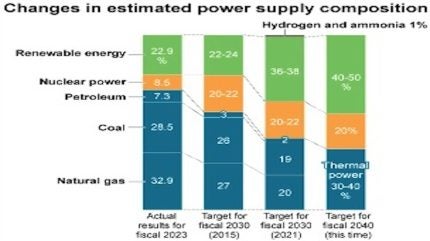
Japan’s Cabinet has approved a new basic energy plan emphasising nuclear power and renewables as its primary carbon-free sources to ensure energy security and achieve net-zero emissions. The government revises its energy plan about every three years. The plan is based on the Basic Energy Policy Law enacted in June 2002.
The new 7th Basic Energy Plan reverses the government’s earlier resolve to minimise reliance on nuclear energy following the 2011 Fukushima crisis. Nuclear power will account for about 20% of the Japan’s total energy output in fiscal 2040, similar to the fiscal 2030 target of 20-22% and a significant increase on the 8.5% in fiscal 2023.
Electricity demand is expected to rise due in part to the prevalence of artificial intelligence and data centres. The government aims to meet high demand by easing requirements for replacing old reactors with new ones. When rebuilding at a plant site is not possible, power companies will be allowed to establish replacement reactors at the premises of other power stations they operate.
Prior to the March 2011 accident at the Fukushima Daiichi plant, Japan’s 54 reactors had provided around 30% of total electricity. However, all nuclear units were subsequently closed pending the introduction of more stringent safety regulations. So far only 14 of Japan’s 36 operable reactors have restarted, while older units have been decommissioned. To achieve a 20% share for nuclear by fiscal 2040, most of these including those currently under construction will need to be in operation.
In February 2023, Japan’s Cabinet approved a policy to allow new nuclear power reactors to be constructed and the operation of existing reactors to be extended from 40 to 60 years. “In order to utilise nuclear power as a decarbonised power source, we will work on the development and installation of next-generation innovative reactors that incorporate new safety mechanisms, aiming to improve the safety of nuclear power,” the plan notes.
The government said it will proceed with the “concrete implementation of next-generation innovative reactors” on the sites of operators who have decided to decommission nuclear power plants, “only if they contribute to the maintenance and development of local industries and employment and can obtain the understanding of the local community”.
It added: “In addition, we will continue to work on technological development toward the practical application of other next-generation innovative reactors, such as fast reactors, high-temperature gas reactors, and fusion energy.”






